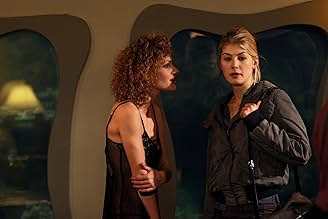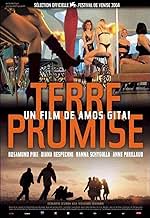AVALIAÇÃO DA IMDb
5,5/10
633
SUA AVALIAÇÃO
Adicionar um enredo no seu idiomaEstonian girls trafficked to Israel are forced into prostitution. The movie shows their struggles, induction into sex trade, and one girl's battle for freedom after an unforeseen incident.Estonian girls trafficked to Israel are forced into prostitution. The movie shows their struggles, induction into sex trade, and one girl's battle for freedom after an unforeseen incident.Estonian girls trafficked to Israel are forced into prostitution. The movie shows their struggles, induction into sex trade, and one girl's battle for freedom after an unforeseen incident.
- Direção
- Roteiristas
- Artistas
- Prêmios
- 1 vitória e 1 indicação no total
- Direção
- Roteiristas
- Elenco e equipe completos
- Produção, bilheteria e muito mais no IMDbPro
Avaliações em destaque
(Some plot spoilers) I saw Amos Gitaï's film 'Promised Land' at the Toronto International Film Festival on September 14, 2004 at its 2nd North American screening. The film had just world premiered at the Venice Film Festival on September 7, 2004 where it won the Emblem of Peace Award.
Director Gitaï was at the screening and made some brief introductory remarks during which he said that the film was dedicated to his mother who had passed away during the course of the filming and who had been a lifelong advocate for women's issues. He also said that his main goal with this film was to portray an anti-'Pretty Woman' point of view and to show that prostitution was in no way a life of glamour, champagne and limousines and that prostitution images of that nature, whether portrayed in film media or elsewhere, were even used by criminal elements to lure young women into sexual slavery. Due to time limitations there was no Q and A session after the film.
Certainly with that introduction and the knowledge that this theme and script had attracted international talent as diverse as Hanna Schygulla (The Marriage of Maria Braun, Lili Marleen, Werckmeister Harmonies), Anne Parillaud (La Femme Nikita, Sex is Comedy) and Rosamund Pike (Die Another Day, The Libertine) to appear in the film, I had very huge expectations. Unfortunately, the film could not fulfill them.
(Spoilers start) The story concerns a group of young Eastern European women who are smuggled across deserts and borders at the beginning of the film and then auctioned off in the middle of the night at an outdoor slave market, although they still stay together throughout the course of the rest of the film. They are finally able to determine that they are in Israel and the title of the film is meant to be taken ironically in their case. They were presumably seeking to escape poverty in their home countries but their fate now is likely to be even more cruel. There is no back story provided except for one character's later flashback about seeing a choir sing in a countryside church back in Estonia and her saying in voice-over that 'Estonia seemed so far away'. It was often difficult to tell the women apart due to the dark lighting of the film (The film was so dark that when the cinema's projector went on the blink about 10 minutes in and started showing only intermittent flashing images, the audience sat and continued to watch for a good half minute or so, thinking it was part of the regular film, until finally a few brave souls started to clap in annoyance. After a short repair, the screening continued.) No character or name introduction was made for most of the women which didn't help the situation. They are just objects to be brutalized and assaulted by the various smugglers and guards during the journey. They end up transported to a restaurant/night club that doubles as a brothel and there they are stripped off and hosed down and then superficially dressed and made-up to attract customers. Hanna Schygulla appears in a cameo as the head madam in charge of this process and Anne Parillaud is a junior madam/gang leader. Again, no background is given about them either (although Schygulla calms one of the young women by making it sound like she herself went through the same tortuous journey at one time). At this point a British woman (played by Rosamund Pike) rather mysteriously appears in the midst of the club and there is some suspense as you wonder whether she is there to help the women as some sort of undercover police agent or whether she is a captive herself. The women are held at night on board a ship in the harbor and it is there where the use of a 'deus ex machina' plot device leads to the resolution. (Spoilers end)
Admittedly, the dehumanizing anonymous treatment that the women receive was probably part of the point in order to convey the cold-hearted brutal nature of the background to prostitution, but it didn't provide the audience with a specific character to identify with for most of the running time and when one of the East European women did finally emerge as the lead in this respect, it seemed like an afterthought and rather too late in the plot.
Overall, this has the feeling of an incomplete effort about a serious subject that really deserved more work and it leaves the impression that the budget and thus the shooting schedule did not allow for more to be done. For comparison, see Lukas Moodysson's 'Lilja 4-ever', which gets a similar story across with much more impact, primarily by focusing on a single young woman.
Disappointing, an important story is not told clearly enough. 5/10
Director Gitaï was at the screening and made some brief introductory remarks during which he said that the film was dedicated to his mother who had passed away during the course of the filming and who had been a lifelong advocate for women's issues. He also said that his main goal with this film was to portray an anti-'Pretty Woman' point of view and to show that prostitution was in no way a life of glamour, champagne and limousines and that prostitution images of that nature, whether portrayed in film media or elsewhere, were even used by criminal elements to lure young women into sexual slavery. Due to time limitations there was no Q and A session after the film.
Certainly with that introduction and the knowledge that this theme and script had attracted international talent as diverse as Hanna Schygulla (The Marriage of Maria Braun, Lili Marleen, Werckmeister Harmonies), Anne Parillaud (La Femme Nikita, Sex is Comedy) and Rosamund Pike (Die Another Day, The Libertine) to appear in the film, I had very huge expectations. Unfortunately, the film could not fulfill them.
(Spoilers start) The story concerns a group of young Eastern European women who are smuggled across deserts and borders at the beginning of the film and then auctioned off in the middle of the night at an outdoor slave market, although they still stay together throughout the course of the rest of the film. They are finally able to determine that they are in Israel and the title of the film is meant to be taken ironically in their case. They were presumably seeking to escape poverty in their home countries but their fate now is likely to be even more cruel. There is no back story provided except for one character's later flashback about seeing a choir sing in a countryside church back in Estonia and her saying in voice-over that 'Estonia seemed so far away'. It was often difficult to tell the women apart due to the dark lighting of the film (The film was so dark that when the cinema's projector went on the blink about 10 minutes in and started showing only intermittent flashing images, the audience sat and continued to watch for a good half minute or so, thinking it was part of the regular film, until finally a few brave souls started to clap in annoyance. After a short repair, the screening continued.) No character or name introduction was made for most of the women which didn't help the situation. They are just objects to be brutalized and assaulted by the various smugglers and guards during the journey. They end up transported to a restaurant/night club that doubles as a brothel and there they are stripped off and hosed down and then superficially dressed and made-up to attract customers. Hanna Schygulla appears in a cameo as the head madam in charge of this process and Anne Parillaud is a junior madam/gang leader. Again, no background is given about them either (although Schygulla calms one of the young women by making it sound like she herself went through the same tortuous journey at one time). At this point a British woman (played by Rosamund Pike) rather mysteriously appears in the midst of the club and there is some suspense as you wonder whether she is there to help the women as some sort of undercover police agent or whether she is a captive herself. The women are held at night on board a ship in the harbor and it is there where the use of a 'deus ex machina' plot device leads to the resolution. (Spoilers end)
Admittedly, the dehumanizing anonymous treatment that the women receive was probably part of the point in order to convey the cold-hearted brutal nature of the background to prostitution, but it didn't provide the audience with a specific character to identify with for most of the running time and when one of the East European women did finally emerge as the lead in this respect, it seemed like an afterthought and rather too late in the plot.
Overall, this has the feeling of an incomplete effort about a serious subject that really deserved more work and it leaves the impression that the budget and thus the shooting schedule did not allow for more to be done. For comparison, see Lukas Moodysson's 'Lilja 4-ever', which gets a similar story across with much more impact, primarily by focusing on a single young woman.
Disappointing, an important story is not told clearly enough. 5/10
My main reason for seeing 'Promised Land', the first film in Amos Gitai's "Border Trilogy", was Rosamund Pike early on in her career. She was a promising young talent at the time and has really grown into a very good and better-than-given-credit-for actress who really delivers in the right role, as can be evidenced in one of the best Best Actress performances of the decade, and one of the best performances that year, in 'Gone Girl'.
There was also intrigue as to how 'Promised Land' would deal with such a heavy, harrowing and nasty subject matter, human trafficking, something that is important to be raised awareness of and not addressed enough in visual media (film and television alike) while also being difficult to do it justice. As can be made clear from watching 'Promised Land'. Any film that takes on a subject such as human trafficking should be applauded for trying, but it is my feeling that 'Promised Land' could have dealt with it much more and handled it with more sincerity and taste. It is neither terrible or great, as a matter to me it's one of those difficult to rate and discuss films, and to be seen to see how human trafficking can be portrayed on screen and for completests of Rosamund Pike and Amos Gitai. That is if one can find it, with that it had a limited release at the time and, other than various websites having it in full, its availability is relatively obscure.
'Promised Land', starting with its strengths, does start off promisingly. It has a very evocative opening scene and some of the first half has a gritty documentary-like feel. Some of it looks good, the first half is shot pretty well, the locations are striking and atmospheric and there is some impressively rich lensing in some of the night sequences.
When it comes to the acting, which is actually not too bad at all considering what they were given, the standouts are Hanna Schygulla bringing a menacing but also comforting charisma to her role (more so than it deserved, with some really clunky dialogue that sounded made up on the spot) and Anne Parillaud, quite moving in hers. Rosamund Pike disappointingly doesn't have that much to do and the role is very limited in depth, but she nonetheless gives a conscientious and brave performance (again like Schygulla, more so than the material deserved). Some scenes are suitably harrowing.
However, 'Promised Land's' promise doesn't last very long. The first half did have its faults, with some of the pacing being dull and taking too long a time to get to the point, but the film really loses its way in the second half. The subject as has been said is unspeakably harrowing, you don't have to have gone through it yourself to know that, so a nasty approach is appropriate and necessary, but it still could have been done with more tact than this. Here the horrors were both excessive and trivialised and the treatment of the women was portrayed in a way that was self-indulgent and gratuitously salacious, done to overkill effect.
Coherence, or lack of it, is also an issue. There is not much going on plot-wise in terms of structure and some of it is aimless. The second half in particular is repetitive and figuring out what's going on beyond the endless stringing of torture (and such) scenes was near-impossible. Telling who was who was the same (the far too dark lighting does not help), with the film having characters that despite the actors' best efforts have no development to them whatsoever. The dialogue is continually clunky and says nothing illuminating about this subject other than what we already know, and Gitai's direction is heavy-handed. Emotional impact is non-existent, the film is just far too distasteful to evoke any kind of empathy and the characters are too flimsily developed to make one care for them properly. Then there's the all too convenient Deux Ex Machina conclusion, which was too much of a cop-out.
Overall, started off with a lot of promise but loses its way drastically in particularly the second half. 5/10 Bethany Cox
There was also intrigue as to how 'Promised Land' would deal with such a heavy, harrowing and nasty subject matter, human trafficking, something that is important to be raised awareness of and not addressed enough in visual media (film and television alike) while also being difficult to do it justice. As can be made clear from watching 'Promised Land'. Any film that takes on a subject such as human trafficking should be applauded for trying, but it is my feeling that 'Promised Land' could have dealt with it much more and handled it with more sincerity and taste. It is neither terrible or great, as a matter to me it's one of those difficult to rate and discuss films, and to be seen to see how human trafficking can be portrayed on screen and for completests of Rosamund Pike and Amos Gitai. That is if one can find it, with that it had a limited release at the time and, other than various websites having it in full, its availability is relatively obscure.
'Promised Land', starting with its strengths, does start off promisingly. It has a very evocative opening scene and some of the first half has a gritty documentary-like feel. Some of it looks good, the first half is shot pretty well, the locations are striking and atmospheric and there is some impressively rich lensing in some of the night sequences.
When it comes to the acting, which is actually not too bad at all considering what they were given, the standouts are Hanna Schygulla bringing a menacing but also comforting charisma to her role (more so than it deserved, with some really clunky dialogue that sounded made up on the spot) and Anne Parillaud, quite moving in hers. Rosamund Pike disappointingly doesn't have that much to do and the role is very limited in depth, but she nonetheless gives a conscientious and brave performance (again like Schygulla, more so than the material deserved). Some scenes are suitably harrowing.
However, 'Promised Land's' promise doesn't last very long. The first half did have its faults, with some of the pacing being dull and taking too long a time to get to the point, but the film really loses its way in the second half. The subject as has been said is unspeakably harrowing, you don't have to have gone through it yourself to know that, so a nasty approach is appropriate and necessary, but it still could have been done with more tact than this. Here the horrors were both excessive and trivialised and the treatment of the women was portrayed in a way that was self-indulgent and gratuitously salacious, done to overkill effect.
Coherence, or lack of it, is also an issue. There is not much going on plot-wise in terms of structure and some of it is aimless. The second half in particular is repetitive and figuring out what's going on beyond the endless stringing of torture (and such) scenes was near-impossible. Telling who was who was the same (the far too dark lighting does not help), with the film having characters that despite the actors' best efforts have no development to them whatsoever. The dialogue is continually clunky and says nothing illuminating about this subject other than what we already know, and Gitai's direction is heavy-handed. Emotional impact is non-existent, the film is just far too distasteful to evoke any kind of empathy and the characters are too flimsily developed to make one care for them properly. Then there's the all too convenient Deux Ex Machina conclusion, which was too much of a cop-out.
Overall, started off with a lot of promise but loses its way drastically in particularly the second half. 5/10 Bethany Cox
It is deeply saddening to realise how misinterpreted this film is by several users. This is one of the greatest works by Gitai thus far. It is obviously about human trafficking and prostitution in Israel; however, there is much more to this film. It tells a story of several Russian women from Estonia that are being trafficked into Egypt and from there, through Gaza strip, into Israel. The style is semi-documentary, which speaks to the reality of the events.
Yet, it seems to me, the message Gitai is sending is not only about the horrors of prostitution in Israel. The subject of female body as a sexual object is in the center of this film. The treatment of women is portrayed in a very bestial and inhumane way. They are traded like cattle, where the highest bidder gets the best animal at an auction. Women are washed with ice-cold water in a group, and then "corrected for" through hasty make-up. The driver that transports women from one "work" spot to another recklessly picks a girl of his choice and rapes her on the road. The scenes are disturbing and made me nauseous on few occasions.
Those who are disappointed about the lack of script or bad acting should look into some documentaries and literature on human trafficking. These are real events that are happening as we speak; to make them more plausible to the viewer or to assign a Hollywood-style script would do no justice to women being trafficked. This film only complements my knowledge of the subject. Congratulations Amos, it takes a lot of courage and determination to create such a piece.
Yet, it seems to me, the message Gitai is sending is not only about the horrors of prostitution in Israel. The subject of female body as a sexual object is in the center of this film. The treatment of women is portrayed in a very bestial and inhumane way. They are traded like cattle, where the highest bidder gets the best animal at an auction. Women are washed with ice-cold water in a group, and then "corrected for" through hasty make-up. The driver that transports women from one "work" spot to another recklessly picks a girl of his choice and rapes her on the road. The scenes are disturbing and made me nauseous on few occasions.
Those who are disappointed about the lack of script or bad acting should look into some documentaries and literature on human trafficking. These are real events that are happening as we speak; to make them more plausible to the viewer or to assign a Hollywood-style script would do no justice to women being trafficked. This film only complements my knowledge of the subject. Congratulations Amos, it takes a lot of courage and determination to create such a piece.
There should be many movies about this topic so that the powers that be actually start to do something about trafficking. But films like this are not the solution.
The film is clearly shot on a budget, mostly on handheld cameras and without much, if anything, of a script or indeed, a plot.
Many scenes are extended to ridiculous length for no good reason except to pad out the run time.
The direction is awful, as is the screenplay, acting, editing and cinematography. It would be possible to re edit this film from its 88 minutes to about a half hour and still get the same level of drama.
I thought with Rosamund Pike and Anne Perrillaud that it might be worth a watch. I was wrong.
The film is clearly shot on a budget, mostly on handheld cameras and without much, if anything, of a script or indeed, a plot.
Many scenes are extended to ridiculous length for no good reason except to pad out the run time.
The direction is awful, as is the screenplay, acting, editing and cinematography. It would be possible to re edit this film from its 88 minutes to about a half hour and still get the same level of drama.
I thought with Rosamund Pike and Anne Perrillaud that it might be worth a watch. I was wrong.
Very strong, violent and depressing well made movie on vicious business of prostitution and slavery. Simple and very tough. Not charming. The bad People who do that with other people come from everywhere. One of the best films from Israeli diretor Amos Gitai.
Você sabia?
- CuriosidadesDirector Amos Gitai said in an interview that he convinced the cast and crew to literally camp out in the desert where the opening sequences were shot. This began because he was tired of the long daily commute from the location to Tel Aviv, but he believes that the fact that most of them agreed to join him, living in tents without running water for days, added to the gritty realism of these scenes, because the actresses were just as unwashed and uncomfortable as their characters.
Principais escolhas
Faça login para avaliar e ver a lista de recomendações personalizadas
- How long is Promised Land?Fornecido pela Alexa
Detalhes
Bilheteria
- Faturamento bruto mundial
- US$ 25.280
- Tempo de duração1 hora 28 minutos
- Cor
- Mixagem de som
- Proporção
- 1.85 : 1
Contribua para esta página
Sugerir uma alteração ou adicionar conteúdo ausente

Principal brecha
By what name was Terra Prometida (2004) officially released in Canada in English?
Responda



















